Alfa Romeo Junior vs Mercedes GLC – Which car suits you better?
Both models have their strengths – but which one suits you more?
Compare performance, efficiency, price and space directly: Alfa Romeo Junior or Mercedes GLC?
Costs and Efficiency:
When it comes to price and running costs, the biggest differences usually appear. This is often where you see which car fits your budget better in the long run.
Alfa Romeo Junior has a clearly advantage in terms of price – it starts at 25700 £, while the Mercedes GLC costs 50300 £. That’s a price difference of around 24656 £.
Fuel consumption also shows a difference: Mercedes GLC manages with 1.60 L and is therefore decisively more efficient than the Alfa Romeo Junior with 4.80 L. The difference is about 3.20 L per 100 km.
As for range, the Alfa Romeo Junior performs clearly better – achieving up to 410 km, about 282 km more than the Mercedes GLC.
Engine and Performance:
Power, torque and acceleration are the classic benchmarks for car enthusiasts – and here, some clear differences start to show.
When it comes to engine power, the Mercedes GLC has a decisively edge – offering 680 HP compared to 280 HP. That’s roughly 400 HP more horsepower.
In acceleration from 0 to 100 km/h, the Mercedes GLC is decisively quicker – completing the sprint in 3.50 s, while the Alfa Romeo Junior takes 5.90 s. That’s about 2.40 s faster.
In terms of top speed, the Mercedes GLC performs evident better – reaching 275 km/h, while the Alfa Romeo Junior tops out at 206 km/h. The difference is around 69 km/h.
There’s also a difference in torque: Mercedes GLC pulls decisively stronger with 1020 Nm compared to 345 Nm. That’s about 675 Nm difference.
Space and Everyday Use:
Beyond pure performance, interior space and usability matter most in daily life. This is where you see which car is more practical and versatile.
Both vehicles offer seating for 5 people.
In curb weight, Alfa Romeo Junior is evident lighter – 1380 kg compared to 1910 kg. The difference is around 530 kg.
In terms of boot space, the Mercedes GLC offers distinct more room – 620 L compared to 415 L. That’s a difference of about 205 L.
In maximum load capacity, the Mercedes GLC performs evident better – up to 1680 L, which is about 400 L more than the Alfa Romeo Junior.
When it comes to payload, Mercedes GLC clearly perceptible takes the win – 600 kg compared to 420 kg. That’s a difference of about 180 kg.
Who wins the race?
The Mercedes GLC proves to be leaves the rival little chance and therefore becomes our DriveDuel Champion!
Mercedes GLC is the better all-rounder in this comparison.
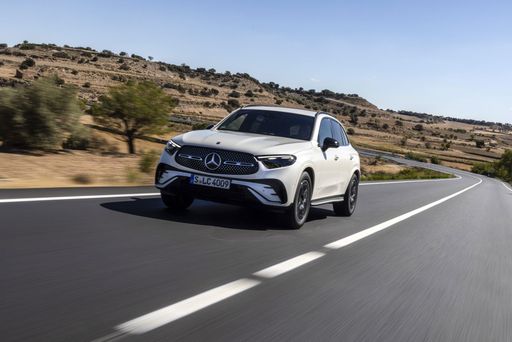 @ Mercedes-Benz Group Media
@ Mercedes-Benz Group Media
Mercedes GLC
Alfa Romeo Junior
The Alfa Romeo Junior captures the essence of Italian design with its sleek lines and compact dimensions, making it an icon of elegance and performance. With a spirited driving experience and a charming retro aesthetic, it appeals to enthusiasts and casual drivers alike. This delightful car embodies the brand's rich heritage while remaining a fun and engaging option for those seeking a unique automotive experience.
details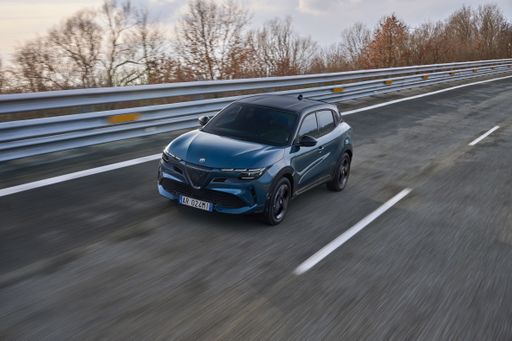 @ Alfa Romeo / Stellantis Media
@ Alfa Romeo / Stellantis Media
 @ Alfa Romeo / Stellantis Media
@ Alfa Romeo / Stellantis Media
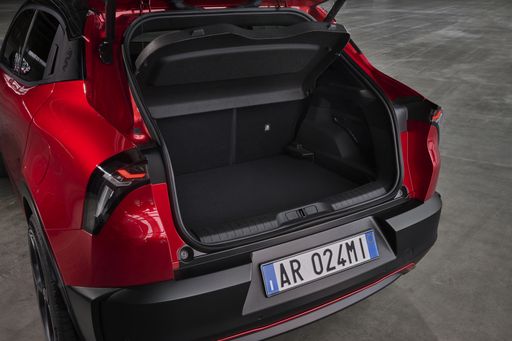 @ Alfa Romeo / Stellantis Media
@ Alfa Romeo / Stellantis Media
Mercedes GLC
The Mercedes-Benz GLC exudes a refined elegance combined with a dynamic and sporty character, making it a standout in the SUV segment. It effortlessly blends luxury with practicality, offering a spacious interior fitted with high-quality materials and advanced technology features. The driving experience is both smooth and responsive, delivering a comfortable ride whether navigating city streets or embarking on longer journeys.
details @ Mercedes-Benz Group Media
@ Mercedes-Benz Group Media
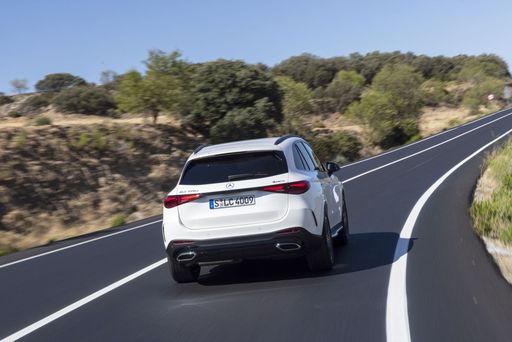 @ Mercedes-Benz Group Media
@ Mercedes-Benz Group Media
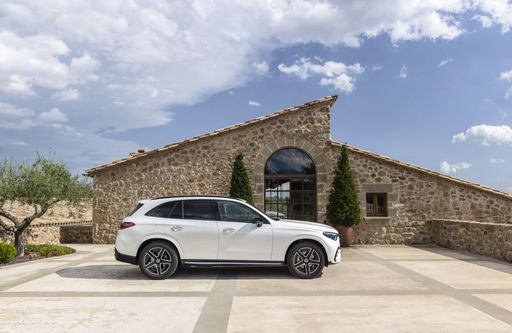 @ Mercedes-Benz Group Media
@ Mercedes-Benz Group Media
 @ Mercedes-Benz Group Media
@ Mercedes-Benz Group Media
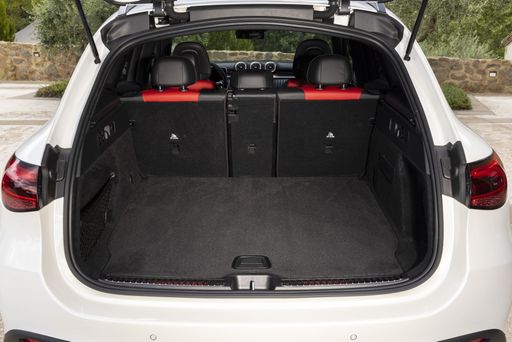 @ Mercedes-Benz Group Media
@ Mercedes-Benz Group Media
 @ Alfa Romeo / Stellantis Media
@ Alfa Romeo / Stellantis Media
|
 @ Mercedes-Benz Group Media
@ Mercedes-Benz Group Media
|
|
|
|
Costs and Consumption |
|
|---|---|
|
Price
25700 - 41600 £
|
Price
50300 - 126600 £
|
|
Consumption L/100km
4.8 - 5.4 L
|
Consumption L/100km
1.6 - 9.9 L
|
|
Consumption kWh/100km
15.1 - 17.5 kWh
|
Consumption kWh/100km
-
|
|
Electric Range
344 - 410 km
|
Electric Range
12 - 128 km
|
|
Battery Capacity
0.4 - 51 kWh
|
Battery Capacity
-
|
|
co2
0 - 119 g/km
|
co2
41 - 225 g/km
|
|
Fuel tank capacity
44 - 45 L
|
Fuel tank capacity
49 - 65 L
|
Dimensions and Body |
|
|---|---|
|
Body Type
SUV
|
Body Type
SUV
|
|
Seats
5
|
Seats
5
|
|
Doors
5
|
Doors
5
|
|
Curb weight
1380 - 1689 kg
|
Curb weight
1910 - 2400 kg
|
|
Trunk capacity
340 - 415 L
|
Trunk capacity
390 - 620 L
|
|
Length
4173 mm
|
Length
4716 - 4792 mm
|
|
Width
1781 mm
|
Width
1890 mm
|
|
Height
1505 - 1538 mm
|
Height
1603 - 1647 mm
|
|
Max trunk capacity
1205 - 1280 L
|
Max trunk capacity
1335 - 1680 L
|
|
Payload
390 - 420 kg
|
Payload
475 - 600 kg
|
Engine and Performance |
|
|---|---|
|
Engine Type
Electric, Petrol MHEV
|
Engine Type
Petrol MHEV, Plugin Hybrid, Diesel MHEV
|
|
Transmission
Automatic
|
Transmission
Automatic
|
|
Transmission Detail
Dual-Clutch Automatic, Reduction Gearbox
|
Transmission Detail
Automatic Gearbox
|
|
Drive Type
Front-Wheel Drive, All-Wheel Drive
|
Drive Type
All-Wheel Drive
|
|
Power HP
136 - 280 HP
|
Power HP
186 - 680 HP
|
|
Acceleration 0-100km/h
5.9 - 9.1 s
|
Acceleration 0-100km/h
3.5 - 9 s
|
|
Max Speed
150 - 206 km/h
|
Max Speed
208 - 275 km/h
|
|
Torque
230 - 345 Nm
|
Torque
320 - 1020 Nm
|
|
Number of Cylinders
3
|
Number of Cylinders
4 - 6
|
|
Power kW
100 - 207 kW
|
Power kW
137 - 500 kW
|
|
Engine capacity
1199 cm3
|
Engine capacity
1991 - 2989 cm3
|
General |
|
|---|---|
|
Model Year
2024 - 2025
|
Model Year
2025
|
|
CO2 Efficiency Class
A, C, D
|
CO2 Efficiency Class
F, G, B
|
|
Brand
Alfa Romeo
|
Brand
Mercedes-Benz
|
What drive types are available for the Alfa Romeo Junior?
Available configurations include Front-Wheel Drive or All-Wheel Drive.
The prices and data displayed are estimates based on German list prices and may vary by country. This information is not legally binding.
